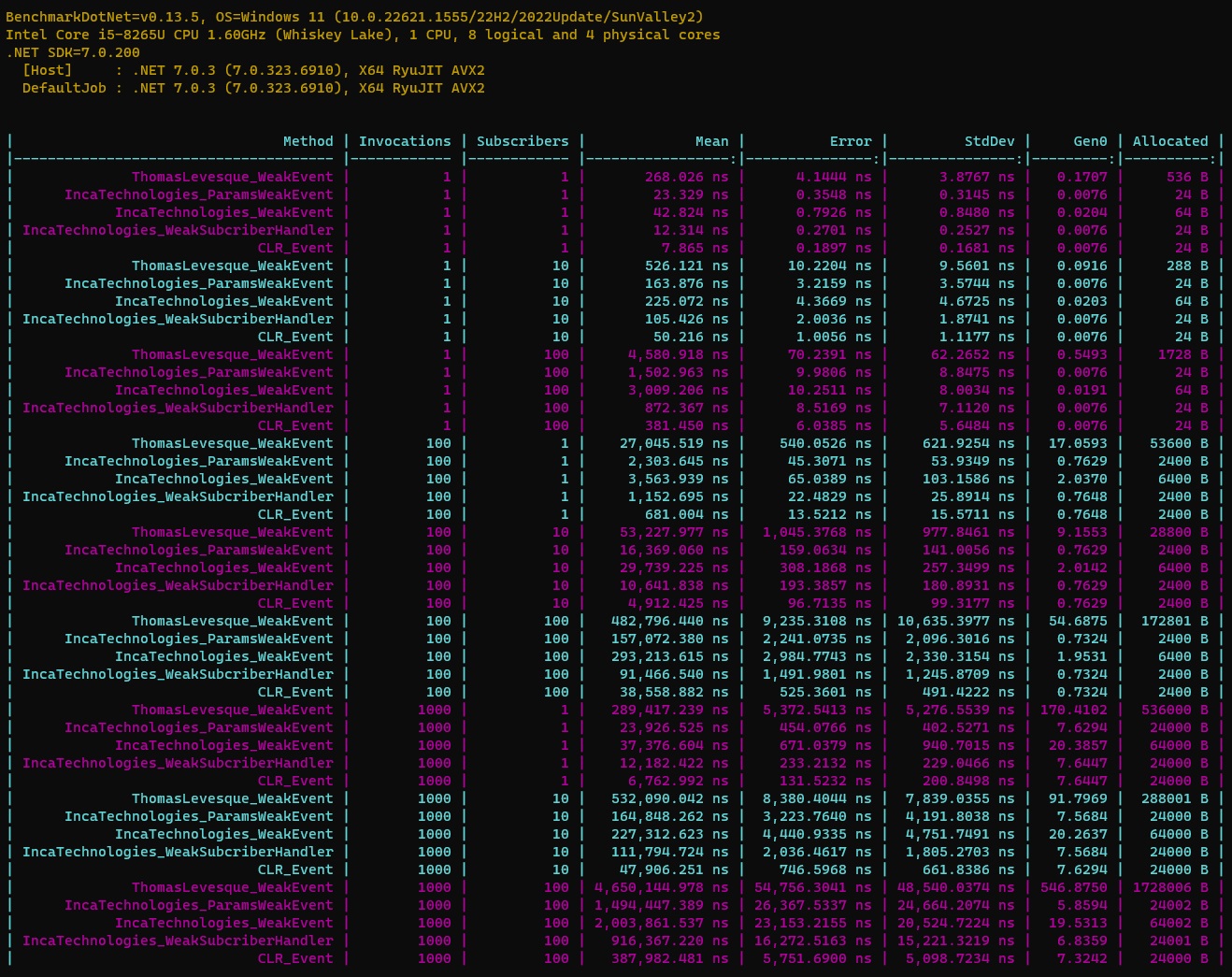IncaTechnologies.WeakEventHandling
1.0.3
Prefix Reserved
dotnet add package IncaTechnologies.WeakEventHandling --version 1.0.3
NuGet\Install-Package IncaTechnologies.WeakEventHandling -Version 1.0.3
<PackageReference Include="IncaTechnologies.WeakEventHandling" Version="1.0.3" />
<PackageVersion Include="IncaTechnologies.WeakEventHandling" Version="1.0.3" />
<PackageReference Include="IncaTechnologies.WeakEventHandling" />
paket add IncaTechnologies.WeakEventHandling --version 1.0.3
#r "nuget: IncaTechnologies.WeakEventHandling, 1.0.3"
#addin nuget:?package=IncaTechnologies.WeakEventHandling&version=1.0.3
#tool nuget:?package=IncaTechnologies.WeakEventHandling&version=1.0.3
IncaTechnologies.WeakEventHandling
Create weak event to prevent memory leaks in you application due to objects with different scope.
When to use it?
Singleton objects that expose events do not let the subscribers to be garbage collected. When you pass an instance method to an event by using the += operator, a delegate is created behind the scene and a reference to the object that contains that method is stored inside the delegate. If the subscriber has a life cicle shorter than the class that expose the event this can lead to a memory leak.
It is always better to unsubscribe from an event once the job is done. Unfortunately, this sometimes can add a lot of complexity to the project. The use of a weak event will prevent the memory leak.
How to use it?
Just use the WeakEventFactory to create a weak event for the handler of your choice. Remember that the handler must have the signature of a void method with a maximum of three parameters.
In the future, I might implement a way to have more parameters.
WeakEvent
This kind of event just needs the event handler type to be created. It is more concise than the ParamsWeakEvent but is less performant. Also the invoke method does not have constraints on the parameters. Be careful to pass the right parameters to the method or exceptions will be thrown.
It is advisable to use this kind of weak event with generic delegates since the instantiation can become verbose. Like IParmasWeakEvent<MyEventHandler<MyClass, MyObject, string>, Myclass, MyObject, string>, pretty verbose.
Example
public class SingletonService
{
private readonly IWeakEvent<EventHandler<EventArgs>> _weakEvent = WeakEventFactory.CreateWeakEvent<EventHandler<EventArgs>>();
public event EventHandler<EventArgs> MyEvent
{
add
{
_weakEvent.Add(value);
}
remove
{
_weakEvent.Remove(value);
}
}
private void OnMyEvent(EventArgs args)
{
_weakEvent.Invoke(args);
}
[...]
}
ParamsWeakEvent
More performant and less error prone implementation.
Example
public delegate void MyEventHandler(ExampleClass sender, int value);
public class SingletonService
{
private readonly IParamsWeakEvent<MyEventHandler, ExampleClass, int> _weakEvent = WeakEventFactory.CreateParamsWeakEvent<MyEventHandler, ExampleClass, int>();
public event MyEventHandler MyEvent
{
add
{
_weakEvent.Add(value);
}
remove
{
_weakEvent.Remove(value);
}
}
private void OnMyEvent(int value)
{
_weakEvent.Invoke(this, value);
}
[...]
}
WeakSubscriber
This is a solution in case you are not in control or you do not want to edit the class that expose the event.
Be careful the object that subscribe to the event will be garbage collected but the WeakSubscriber is an object itself and it will leak. So, it makes sense to use it only for heavy objects that want to subscribe to an event and have a shorter life span than the event publisher.
Example
public class MyTransientClass
{
public byte[]? MyFatImage { get; set; }
public MyTransientClass(ISingletonService service)
{
service.SomethingChanged += WeakSubscriberFactory.Create<EventHandler<Something>>(SingletonService_SomethingChanged).WeakHandler;
}
private void SingletonService_SomethingChanged(object? sender, Something something)
{
[...]
}
}
How about the performances?
I performed some benchmarks. Here the results:

Disclaimer
For comparison purposes, I used ThomasLevesque WeakEvent since it looks to be the most popular on NuGet.org. But I am not affiliated to them and none of their code has been used to create this library.
If anyone has any complain about the use of this package in my benchmarks please open an issue on GitHub or send an email and I will immediately remove any refererence to this library.
Contribution
Do you like this library and you want to add or change something? Feel free to do it, just create your pull request on GitHub.
| Product | Versions Compatible and additional computed target framework versions. |
|---|---|
| .NET | net5.0 was computed. net5.0-windows was computed. net6.0 was computed. net6.0-android was computed. net6.0-ios was computed. net6.0-maccatalyst was computed. net6.0-macos was computed. net6.0-tvos was computed. net6.0-windows was computed. net7.0 was computed. net7.0-android was computed. net7.0-ios was computed. net7.0-maccatalyst was computed. net7.0-macos was computed. net7.0-tvos was computed. net7.0-windows was computed. net8.0 was computed. net8.0-android was computed. net8.0-browser was computed. net8.0-ios was computed. net8.0-maccatalyst was computed. net8.0-macos was computed. net8.0-tvos was computed. net8.0-windows was computed. net9.0 was computed. net9.0-android was computed. net9.0-browser was computed. net9.0-ios was computed. net9.0-maccatalyst was computed. net9.0-macos was computed. net9.0-tvos was computed. net9.0-windows was computed. |
| .NET Core | netcoreapp3.0 was computed. netcoreapp3.1 was computed. |
| .NET Standard | netstandard2.1 is compatible. |
| MonoAndroid | monoandroid was computed. |
| MonoMac | monomac was computed. |
| MonoTouch | monotouch was computed. |
| Tizen | tizen60 was computed. |
| Xamarin.iOS | xamarinios was computed. |
| Xamarin.Mac | xamarinmac was computed. |
| Xamarin.TVOS | xamarintvos was computed. |
| Xamarin.WatchOS | xamarinwatchos was computed. |
-
.NETStandard 2.1
- No dependencies.
NuGet packages
This package is not used by any NuGet packages.
GitHub repositories
This package is not used by any popular GitHub repositories.
1.0.0 - First release
1.0.1 - Improved the cleaning of dead reference in the weak events
1.0.2 - Minor fixes
1.0.3 - Bug fixes